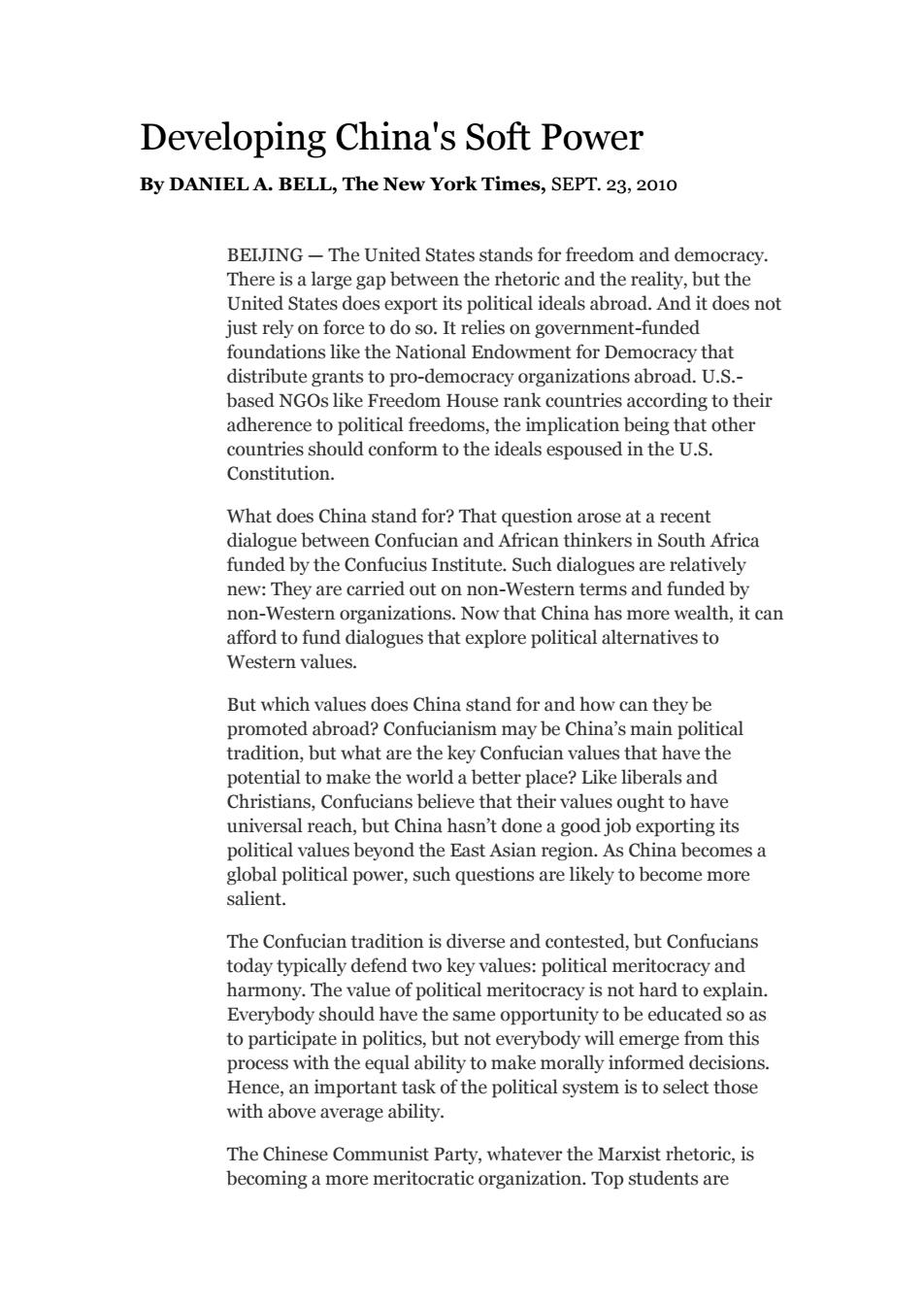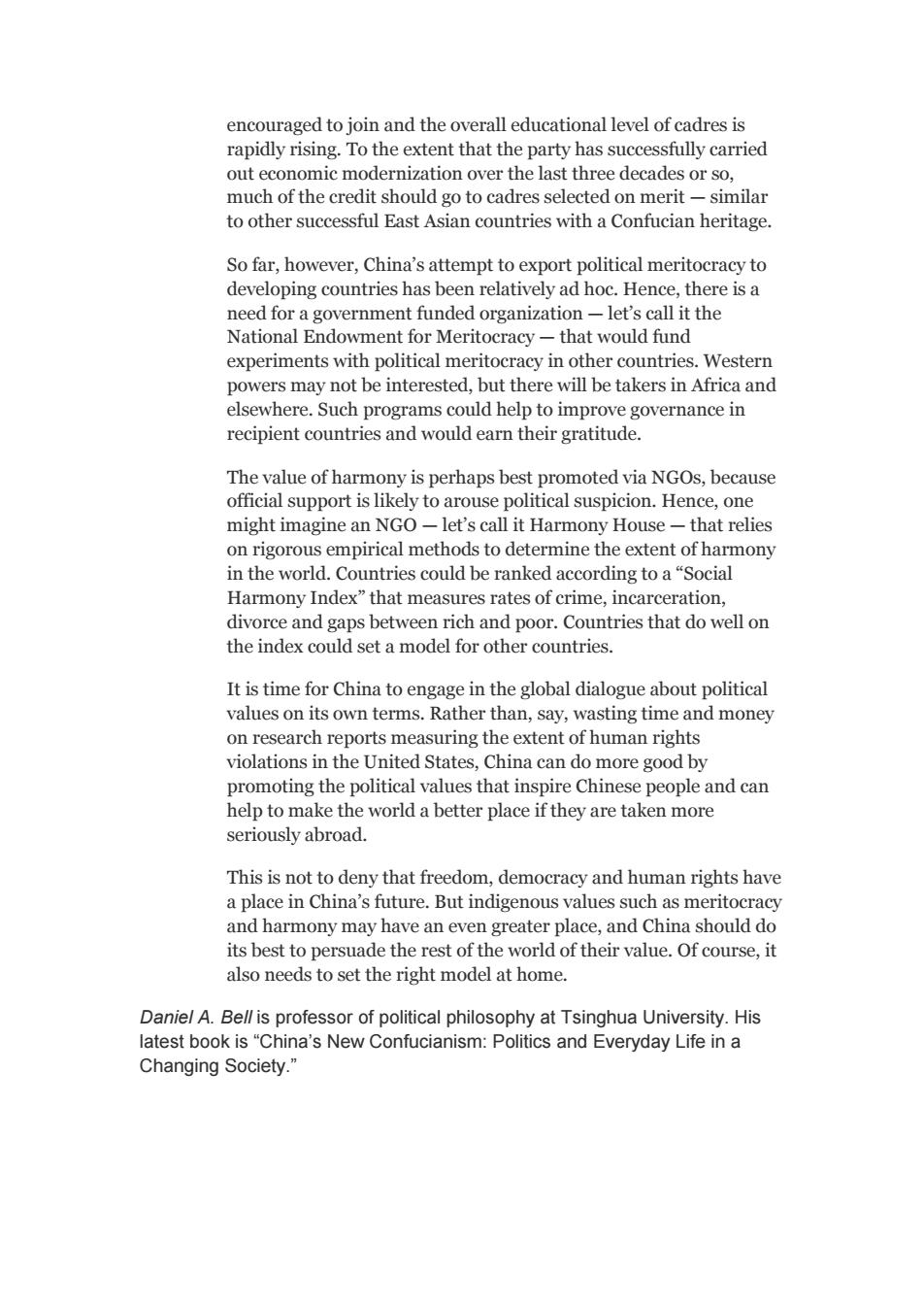
Developing China's Soft Power By DANIEL A.BELL,The New York Times,SEPT.23,2010 BEIJING-The United States stands for freedom and democracy. There is a large gap between the rhetoric and the reality,but the United States does export its political ideals abroad.And it does not just rely on force to do so.It relies on government-funded foundations like the National Endowment for Democracy that distribute grants to pro-democracy organizations abroad.U.S.- based NGOs like Freedom House rank countries according to their adherence to political freedoms,the implication being that other countries should conform to the ideals espoused in the U.S. Constitution. What does China stand for?That question arose at a recent dialogue between Confucian and African thinkers in South Africa funded by the Confucius Institute.Such dialogues are relatively new:They are carried out on non-Western terms and funded by non-Western organizations.Now that China has more wealth,it can afford to fund dialogues that explore political alternatives to Western values. But which values does China stand for and how can they be promoted abroad?Confucianism may be China's main political tradition,but what are the key Confucian values that have the potential to make the world a better place?Like liberals and Christians,Confucians believe that their values ought to have universal reach,but China hasn't done a good job exporting its political values beyond the East Asian region.As China becomes a global political power,such questions are likely to become more salient. The Confucian tradition is diverse and contested,but Confucians today typically defend two key values:political meritocracy and harmony.The value of political meritocracy is not hard to explain. Everybody should have the same opportunity to be educated so as to participate in politics,but not everybody will emerge from this process with the equal ability to make morally informed decisions. Hence,an important task of the political system is to select those with above average ability. The Chinese Communist Party,whatever the Marxist rhetoric,is becoming a more meritocratic organization.Top students are
Developing China's Soft Power By DANIEL A. BELL, The New York Times, SEPT. 23, 2010 BEIJING — The United States stands for freedom and democracy. There is a large gap between the rhetoric and the reality, but the United States does export its political ideals abroad. And it does not just rely on force to do so. It relies on government-funded foundations like the National Endowment for Democracy that distribute grants to pro-democracy organizations abroad. U.S.- based NGOs like Freedom House rank countries according to their adherence to political freedoms, the implication being that other countries should conform to the ideals espoused in the U.S. Constitution. What does China stand for? That question arose at a recent dialogue between Confucian and African thinkers in South Africa funded by the Confucius Institute. Such dialogues are relatively new: They are carried out on non-Western terms and funded by non-Western organizations. Now that China has more wealth, it can afford to fund dialogues that explore political alternatives to Western values. But which values does China stand for and how can they be promoted abroad? Confucianism may be China’s main political tradition, but what are the key Confucian values that have the potential to make the world a better place? Like liberals and Christians, Confucians believe that their values ought to have universal reach, but China hasn’t done a good job exporting its political values beyond the East Asian region. As China becomes a global political power, such questions are likely to become more salient. The Confucian tradition is diverse and contested, but Confucians today typically defend two key values: political meritocracy and harmony. The value of political meritocracy is not hard to explain. Everybody should have the same opportunity to be educated so as to participate in politics, but not everybody will emerge from this process with the equal ability to make morally informed decisions. Hence, an important task of the political system is to select those with above average ability. The Chinese Communist Party, whatever the Marxist rhetoric, is becoming a more meritocratic organization. Top students are

encouraged to join and the overall educational level of cadres is rapidly rising.To the extent that the party has successfully carried out economic modernization over the last three decades or so, much of the credit should go to cadres selected on merit-similar to other successful East Asian countries with a Confucian heritage. So far,however,China's attempt to export political meritocracy to developing countries has been relatively ad hoc.Hence,there is a need for a government funded organization-let's call it the National Endowment for Meritocracy-that would fund experiments with political meritocracy in other countries.Western powers may not be interested,but there will be takers in Africa and elsewhere.Such programs could help to improve governance in recipient countries and would earn their gratitude. The value of harmony is perhaps best promoted via NGOs,because official support is likely to arouse political suspicion.Hence,one might imagine an NGO-let's call it Harmony House-that relies on rigorous empirical methods to determine the extent of harmony in the world.Countries could be ranked according to a"Social Harmony Index"that measures rates of crime,incarceration, divorce and gaps between rich and poor.Countries that do well on the index could set a model for other countries. It is time for China to engage in the global dialogue about political values on its own terms.Rather than,say,wasting time and money on research reports measuring the extent of human rights violations in the United States,China can do more good by promoting the political values that inspire Chinese people and can help to make the world a better place if they are taken more seriously abroad. This is not to deny that freedom,democracy and human rights have a place in China's future.But indigenous values such as meritocracy and harmony may have an even greater place,and China should do its best to persuade the rest of the world of their value.Of course,it also needs to set the right model at home. Danie/A.Bell is professor of political philosophy at Tsinghua University.His latest book is"China's New Confucianism:Politics and Everyday Life in a Changing Society
encouraged to join and the overall educational level of cadres is rapidly rising. To the extent that the party has successfully carried out economic modernization over the last three decades or so, much of the credit should go to cadres selected on merit — similar to other successful East Asian countries with a Confucian heritage. So far, however, China’s attempt to export political meritocracy to developing countries has been relatively ad hoc. Hence, there is a need for a government funded organization — let’s call it the National Endowment for Meritocracy — that would fund experiments with political meritocracy in other countries. Western powers may not be interested, but there will be takers in Africa and elsewhere. Such programs could help to improve governance in recipient countries and would earn their gratitude. The value of harmony is perhaps best promoted via NGOs, because official support is likely to arouse political suspicion. Hence, one might imagine an NGO — let’s call it Harmony House — that relies on rigorous empirical methods to determine the extent of harmony in the world. Countries could be ranked according to a “Social Harmony Index” that measures rates of crime, incarceration, divorce and gaps between rich and poor. Countries that do well on the index could set a model for other countries. It is time for China to engage in the global dialogue about political values on its own terms. Rather than, say, wasting time and money on research reports measuring the extent of human rights violations in the United States, China can do more good by promoting the political values that inspire Chinese people and can help to make the world a better place if they are taken more seriously abroad. This is not to deny that freedom, democracy and human rights have a place in China’s future. But indigenous values such as meritocracy and harmony may have an even greater place, and China should do its best to persuade the rest of the world of their value. Of course, it also needs to set the right model at home. Daniel A. Bell is professor of political philosophy at Tsinghua University. His latest book is “China’s New Confucianism: Politics and Everyday Life in a Changing Society